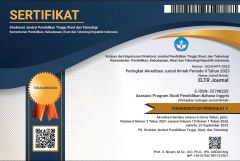TEACHER IDENTITY EXPERIENCED BY MR. BARTHES AS DEPICTED IN DETACHMENT MOVIE
Abstrak terlihat: 518 / PDF terunduh: 1003DOI:
https://doi.org/10.37147/eltr.v2i1.56Keywords:
Detachment movie, Mr. Barthes, teacher identityAbstract
This paper investigates teacher identity which exists in the main character in a movie called Detachment. Mr. Henry Barthes (Adrien Brody) who is a substitute teacher and now he is teaching in a high school. While he is teaching, he has to encounter some distractions from Erica (Sami Gayle) a prostitute, one of his students, Meredith (Betty Kaye), and his colleague Ms. Madison (Christina Hendricks). While he faces the distractions, he has to deal with his childhood memory about the suicide of his mother and the death of his grandfather. All of distractions he faces at the end of the day he is able to handle the distractions and his teacher identity is a proof that his students adore him. The analysis data of the method is data analysis by watching the movie and the findings can be found in the movie in a form of how the teacher explains the material to the students, the teacher’s thoughts, and the teacher’s actions.
Downloads
References
Black, L. (2004). Teacher-pupil talk in whole-class discussions and processes of social positioning within the primary school classroom. Language and Education, 18(5), 347-360.
Cameron, D. (2001). Working with spoken discourse. London: Sage Publications.
Creswell, J. W. (2012). Qualitative inquiry and research design: Choosing among five approaches (3rd ed.). Thousand Oaks, CA: Sage Publications.
Ebersöhn, L., & Loots, T. (2017). Teacher agency in challenging contexts as a consequence of social support and resource management. International Journal of Educational Development, 53, 80-91.
Henkle, R. B. (1977). Reading the novel: An introduction to the techniques of interpreting fiction. New York: Harper & Row, Publ.
Izadinia, M. (2013). A review of research on student teachers' professional identity. British Educational Research Journal, 39(4), 694-713.
Kayi?Aydar, H. (2014). Social positioning, participation, and second language learning: Talkative students in an academic ESL classroom. TESOL Quarterly, 48(4), 686-714.
Liu, Y., & Xu, Y. (2011). Inclusion or exclusion?: A narrative inquiry of a language teacher’s identity experience in the ‘new work order’of competing pedagogies. Teaching and Teacher Education, 27(3), 589-597.
Murphy, M. J. (1972). Understanding unseen: An introduction to English poetry and the English novel for overseas students. London: George Allen & Unwin Ltd.
Norton, B. (1997). Language, identity, and the ownership of English. TESOL quarterly, 31(3), 409-429.
Pennington, M. C., Richards, J. C. (2016). Teacher identity in language teaching: Integrating personal, contextual, and professional factors. RELC Journal, 47, 5–23.
Ruohotie_Lyhty, M. (2016). Who and how? Preservice teachers as active agents developing professional identities. Teaching and Teacher Education, 55, 318–327.
Varghese, M., Morgan, B., Johnston, B., & Johnson, K. A. (2005). Theorizing language teacher identity: Three perspectives and beyond. Journal of Language, Identity, and Education, 4(1), 21-44.
Harré, R. (1999). Introducing positioning theory. In L. van Langenhove, & R. Harré (Eds.), Positioning theory: Moral contexts of intentional action. (1st ed., pp. 14-31). Oxford: Blackwell.
Yoon, B. (2008). Uninvited guests: The influence of teachers' roles and pedagogies on the positioning of English language learners in the regular classroom. American Educational Research Journal, 45(2), 495-522.
Zembylas, M. (2003). Emotions and teacher identity: A poststructural perspective. Teachers and Teaching, 9(3), 213-238.
Downloads
Published
How to Cite
Issue
Section
License
Copyright (c) 2018 Paulus Tri Nugroho Putro

This work is licensed under a Creative Commons Attribution-ShareAlike 4.0 International License.













